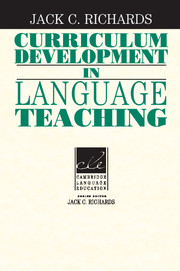Book contents
- Frontmatter
- Contents
- Series editor's preface
- Preface
- Credits
- 1 The origins of language curriculum development
- 2 From syllabus design to curriculum development
- 3 Needs analysis
- 4 Situation analysis
- 5 Planning goals and learning outcomes
- 6 Course planning and syllabus design
- 7 Providing for effective teaching
- 8 The role and design of instructional materials
- 9 Approaches to evaluation
- Author index
- Subject index
Preface
Published online by Cambridge University Press: 03 May 2010
- Frontmatter
- Contents
- Series editor's preface
- Preface
- Credits
- 1 The origins of language curriculum development
- 2 From syllabus design to curriculum development
- 3 Needs analysis
- 4 Situation analysis
- 5 Planning goals and learning outcomes
- 6 Course planning and syllabus design
- 7 Providing for effective teaching
- 8 The role and design of instructional materials
- 9 Approaches to evaluation
- Author index
- Subject index
Summary
Like many language teaching professionals, I entered the field of language teaching as a classroom teacher, anticipating that as I accumulated experience and professional knowledge, I would become a better teacher. As many others have discovered, however, I soon came to realize that being an effective teacher meant much more than becoming a more skillful and knowledgeable classroom practitioner. It meant learning how to develop and adapt materials, to plan and evaluate courses, to adapt teaching to students' needs, and to function within an institutional setting. It became clear that effective teaching was dependent on understanding the context for teaching, the needs of teachers and learners, the careful planning of courses and materials, as well as the monitoring of teaching and learning. In short, it was necessary to try to understand teaching as a part of an interrelated set of factors and processes that are often referred to as curriculum development.
This book seeks to describe and examine the processes of curriculum development in language teaching in order to acquaint language teachers and teachers-in-training with fundamental issues and practices in language curriculum development. Curriculum development is an essentially practical activity since it seeks to improve the quality of language teaching through the use of systematic planning, development, and review practices in all aspects of a language program. The book tries to provide as many examples as possible of how some of the practical problems in language program development have been addressed by practitioners in many parts of the world.
- Type
- Chapter
- Information
- Curriculum Development in Language Teaching , pp. xi - xiiiPublisher: Cambridge University PressPrint publication year: 2001

